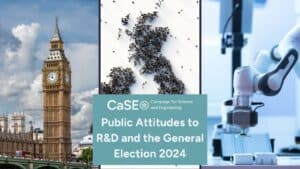Public Opinion during the 2024 General Election Campaign: universities and international talent
24 Jul 2024
Florence Young
Policy Officer
CaSE’s latest public opinion poll, carried out during the election campaign in June 2024, explores the UK public’s feelings about international students and researchers coming to UK universities.
Research is a global endeavour. As CaSE has previously emphasised, migration offers enormous benefits to the UK R&D sector, bringing in diverse ideas and cultural approaches, increasing international collaboration and knowledge exchange, and addressing R&D-skills shortages. With UK universities under significant financial pressure, cross-subsidy of research from international student fees is common.
However, recent changes to UK immigration policy have been serving as a deterrent to international students and researchers, and we are already seeing a reduction in overseas student numbers.
Immigration policy featured heavily throughout the General Election and, with a new Government setting out its priorities, it is more important than ever that the R&D sector understands public attitudes to international talent to best inform its advocacy.
Our latest survey, a nationally representative poll of 4,100 UK adults in June 2024, asked a series of questions to understand public attitudes to the quality of UK universities, international student numbers, international researchers, and the trade offs between restricting immigration and attracting global talent. All our polling was carried out by research agency Public First.
Our key findings are that:
CaSE will continue to monitor trends in attitudes to R&D to ensure the sector has the most up to date tools for its advocacy with the new Government and Parliament.
UK universities
More than two-thirds agree that the UK’s universities are some of the best in the world, with more than half of these citing the fact international students want to study in them
Skills minister Jacqui Smith recognised in her maiden speech in the House of Lords that “‘universities are vital engines for economic growth and opportunity for everybody throughout their lives”. CaSE welcomes these comments, which align with our recent briefing that highlights the diverse benefits of UK universities.
It is positive to see that the public also sees the value of UK universities. A majority (69%) agree that “The universities in the UK are some of the best in the world”. When asked why, the most commonly selected reason was the fact that many international students want to study in them. In addition, around half think universities have a positive impact on the UK, produce high quality R&D, and have a positive impact on the local area in which they’re based.
International Students and Researchers
Around 4 in 10 think UK universities shouldn’t change the number of international students they accept
When framed around the benefits they bring the UK and recruiting global talent, the majority view international students coming to the UK as a positive thing
Given both the rhetoric and changes to immigration policy in recent years affecting international students and researchers coming to the UK, we asked a series of questions exploring public opinion on international students and overseas recruitment to UK universities.
When asked whether UK universities should accept more or less of different types of prospective students, a plurality (42%) thought universities should not change the number of international students they accept.
However, when framed in the context of the benefits international students offer, such as supporting the work of UK universities or contributing to the wider economy, a majority said they would be happy for international students to come to the UK (70% and 65%, respectively).
Similarly, respondents said that UK universities employing international researchers would diversify ideas and culture; bring improvements to the economy; opportunities to collaborate internationally; strengthen the quality of R&D; and bring in top talent.
It is vital for the R&D sector to emphasise these benefits when advocating for policy reform enabling international recruitment.
Immigration policy reforms and trade offs
People were more likely to see hypothetical immigration reforms that led to negative impacts for R&D and university recruitment as a failure than a success
A majority would prefer universities in the UK to recruit the best global talent, even if it means more immigration to the UK
CaSE strongly supports the Graduate Route visa – which allows international students to stay in the UK for a limited time after they finish studying – and we are pleased to see that the new Labour government has just announced its intention to maintain the Graduate Route.
Our polling suggests that this decision would gain support from many members of the public. Without naming the Graduate Route visa, we asked respondents whether they felt immigration reforms that meant that more international students could stay to work in the UK for a limited time after finishing their studies would be a success or a failure, 51% said it would be a success.
In addition, a majority (52%) would prefer universities in the UK to recruit to the best global talent, even if it means more immigration to the UK for these roles. By comparison, only 35% said they would prefer to keep immigration to the UK lower, even if it means UK universities are unable to recruit some of the best talent. This offers further evidence of public support of immigration when it will benefit the UK.
Explore the data

Related resources

This briefing summarises attitudes to immigration, international students and researchers, and their impact on UK R&D. It is based on evidence from a nationally representative survey of 4,100 UK adults in June 2024 and two focus groups in December 2024.

This briefing summarises attitudes to the UK Government’s missions from CaSE’s September 2024 public attitudes study.

Analysis and highlights from CaSE’s research into public attitudes towards R&D and the Government’s missions.
